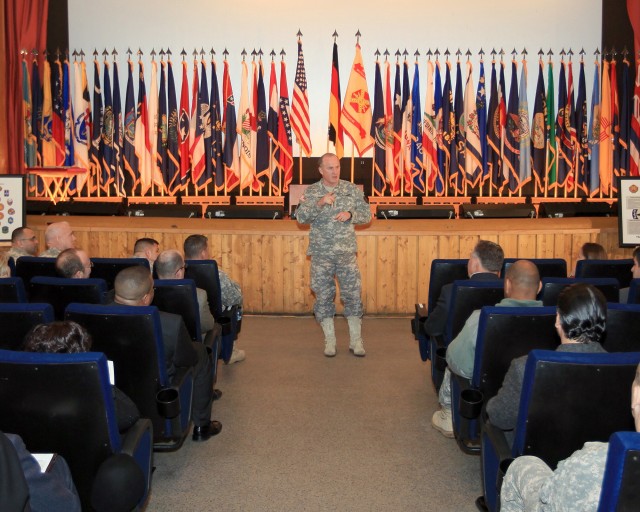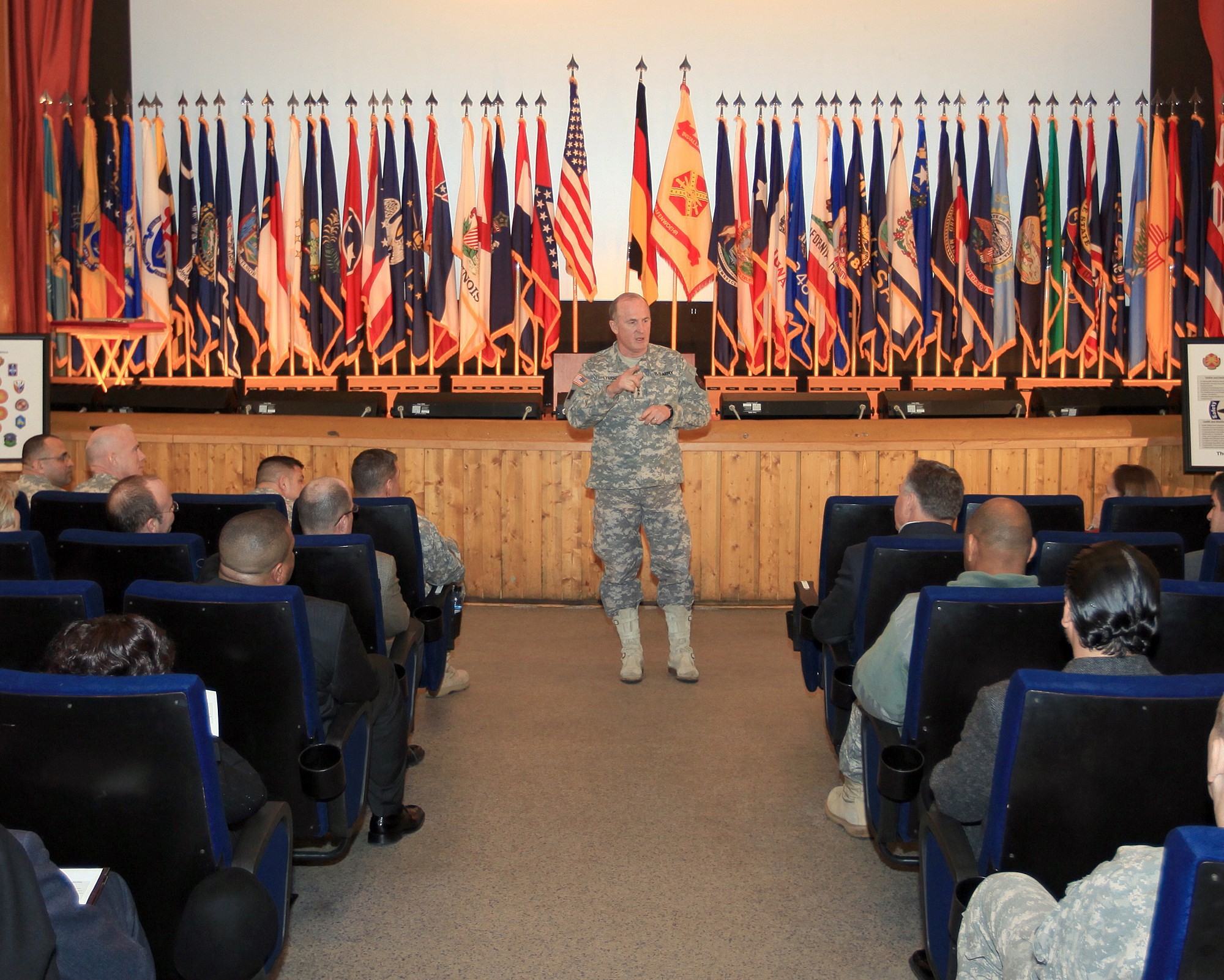HEIDELBERG, Germany -- Through the ages, great military campaigns have proven to be the hallmarks of great leaders under the most trying of circumstances.
Consider a 20-something Alexander the Great and his force of 20,000 that crushed a Persian Army outnumbering him by a factor of five, the brilliant leadership of Julius Caesar in defeating a Gaul force outnumbering him by 8 to 1, or Marshall Zhukov's masterful campaign that turned a last-ditch defense into a counter-attack that completely obliterated the German Army in the snows of Russia.
During the recent whirlwind visit of the Installation Management Command commander to Europe garrisons, the first since taking command of the organization that oversees the Army's 163 Army garrisons, Lt. Gen. Rick Lynch spoke about the launch of a military campaign of a slightly different flavor.
"The current campaign is entitled 'Stamp out Stupid' because it amazes me at some of the stupid things we still do," Lynch candidly remarked to a large group of IMCOM employees at a town hall meeting in Heidelberg recently, referring to wasteful processes and functions he's witnessed at garrisons and at IMCOM staff levels.
"I get it all the time, when I'm walking around at one of 163 installations in the Army worldwide, where people are doing stuff that they know is stupid, and I ask them, 'What are you doing,' and they say 'Well sir, we've always done it that way.' Well that's a stupid answer to the question," he said to the laughter of the Heidelberg audience.
"There are things that we are doing today that are fundamentally stupid that we've got to stop," he said, going on to explain that he recently solicited every garrison commander in the Army for their input to get to the root of what processes and programs don't make sense or needlessly waste already lean resources at Army garrisons.
From the input received, he then narrowed input to a list of 100 issues. Of those, he will announce later this month 60 processes that will be immediately ceased at all garrisons. A further 30 were identified as regulatory, policy or legislative issues that will be changed or eliminated through deliberate staff work over time, while 10 issues remained.
"These [10] things aren't stupid, the person who submitted them was stupid," Lynch joked to the laughter of the audience. "They didn't know why we were doing these things so what we're going to do is communicate why they are being done this way, and then it won't appear to be stupid."
In addition to unveiling the Stamp out Stupid campaign, in April at the AUSA installation symposium in San Antonio, Lynch will unfurl his campaign plan, charting the way forward for IMCOM for outlying years.
Lynch explained that his campaign plan will also streamline bureaucracy that will make life better for him and, most importantly, garrison commanders who are often consumed with these cumbersome processes. He used the example of the 4,000 IMCOM metrics he is currently expected to use to make decisions about Army garrisons, a number that his campaign plan will reduce to a mere 186.
"Let's face it, the only reason we do that metric analysis is to refine the information I need before I make decisions on resource allocation," he stated. "Do you really believe that I sit there in my office or my house and review 4,000 data points on a daily basis to make decisions'"
Lynch acknowledged the strange twist of irony of his appointment to command IMCOM current command after having personally endured the frustrations at having been an IMCOM "customer" during previous senior commander tours in Georgia and Texas. It was clear that this fact is driving his quest to bring about improvements during his command that will make IMCOM more value added to Army commanders and families.
"See, I'd been a Corps commander, and that's the reason candidly that I'm in this job now," he admitted. "So nobody can say Lynch and Sergeant Major Ciotola don't understand the issues, because for over 30 years we've lived it."
He also acknowledged the image challenge he and the entire IMCOM command face as it devises a collective strategy to help the garrison commanders and their staffs do the very best they can to support the senior commander on the installation that truly take care of our Soldiers, their families and the great civilian workforce on the installation.
"A lot of my peers, two- and three-star generals today, they don't believe that IMCOM should exist," he frankly offered, adding that, "I was so frustrated at Fort Stewart and Fort Hood, Texas, that somebody at IMCOM in San Antonio or Washington, D.C., was telling me what's best for my installation."
"It made no sense, because they weren't walking the streets, they weren't in the PX, they weren't in the hospital, they weren't in the commissary, they weren't living in the houses, they weren't living in the barracks. So how could they sit and watch then try to tell me what to do," he remarked.
Lynch and his wife, Sarah, accompanied by IMCOM Command Sgt. Maj. Neil Ciotola, also spent a great deal of time during their visit expressing appreciation to forward stationed Army families and the civilian workforce for their sacrifices.
"I tell people all the time that you have a choice in life as an adult, you can either read history or you can make history, and IMCOM's chosen to make history," he excitedly explained during his Heidelberg Town Hall presentation.
"I worry that folks like you think that the real critical piece is walking the streets, the battlefield of Baghdad or Kabul or wherever they're going to be, and it's not true," he said to the crowd of IMCOM employees in Heidelberg. "The critical piece is walking the streets here in Germany, or in Italy, or back in the States, and taking care of the families."
He said he feels he and his sergeant major's experience as combat leaders has placed him in a perfect position to bring the command of IMCOM to new levels of effectiveness, respect and impact on the force, its families and the workforce. He weaved in the relationship of his wife to drive home the point.
"We worry all the time, not about these older married couples -- Sarah and I have been married for 27 years, and I've been away from this lady four of the last seven years -- but we're got a relationship that has stood the test of time," he stated. "But while being apart is a strain in our relationship, can you just imagine the strain on a relationship in a family that's newly married with newborn children'"
Lynch went on to relate the story of a young captain came into his office when he was the Corps commander with tears in his eyes, and he was begging for help after having served for five years, and in those five years had been deployed three times. He had just received orders to the Joint Readiness Training Center, a job that was going to cause him to be away from my family even more than when he was deployed.
"He looked me in the eye and he said, 'General, my son is 4 years old, and he calls me by his first name because he doesn't know me as a father,'" Lynch said.
"That's the challenge we're dealing with in the military right now, and with that kind of strain on the families, we'll do the best we can as the IMCOM family to focus on the Army family."
That's certainly a military campaign that will be worthy of greatness and the history books.


Social Sharing